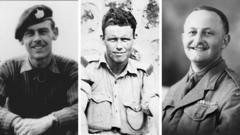
In a poignant ceremony at the UN cemetery in Busan, South Korea, families of British soldiers killed in the Korean War have finally found closure as their loved ones’ identities are revealed after decades of uncertainty.
Michael Northey, now in a wheelchair, attended the ceremony to honor his father, Sergeant D. Northey, who was killed in action in 1951 when Michael was just a baby. For 70 years, his father’s grave bore only the inscription “Member of the British Army, known unto God.” Now, it displays his full name and details, marking a significant moment for Michael, who had long given up hope of discovering his father’s fate.
The breakthrough came through the dedicated work of Nicola Nash, a forensic researcher from the Joint Casualty and Compassionate Centre. Tasked with identifying Korean War casualties, Nash meticulously combed through archives, burial reports, and eyewitness accounts to uncover the identities of four previously unknown British soldiers.
Among those identified were Sergeant Northey and Major Patrick Angier, both killed during the Battle of Imjin River in April 1951. During this crucial battle, British forces were vastly outnumbered by Chinese troops but held their position for three days, allowing allied forces to retreat and defend Seoul. The chaotic nature of the battle, with most soldiers killed or captured and dog tags deliberately scattered, had previously made identification impossible.
Major Angier’s daughter Tabby, now 77, shared emotional memories of her father. She was just three when he left for war and had only fragmented recollections. At the ceremony, she and her son read excerpts from her father’s letters, including his poignant message about missing his children.
Another remarkable story involves Cameron Adair, a 25-year-old who discovered his great-great uncle, Corporal William Adair, for the first time. Killed in January 1951 during a Chinese offensive, Corporal Adair had no children, and his memory had been lost with his wife’s passing. Cameron expressed pride in learning about his relative’s sacrifice and was inspired to potentially serve himself.
Nash’s work represents a six-year “labour of love” that has brought closure to families who had spent decades wondering about their loved ones’ final moments. She is now collecting DNA samples from relatives of the remaining 300 missing British soldiers, hoping to continue her mission of identification.
The ceremony took place among rows of small stone graves marking the thousands of foreign soldiers who died in the Korean War. Accompanied by serving soldiers from their loved ones’ old regiments, the families finally had the opportunity to say goodbye and find peace.
As Nash eloquently stated, “If there are still British personnel missing, we will keep trying to find them.”







